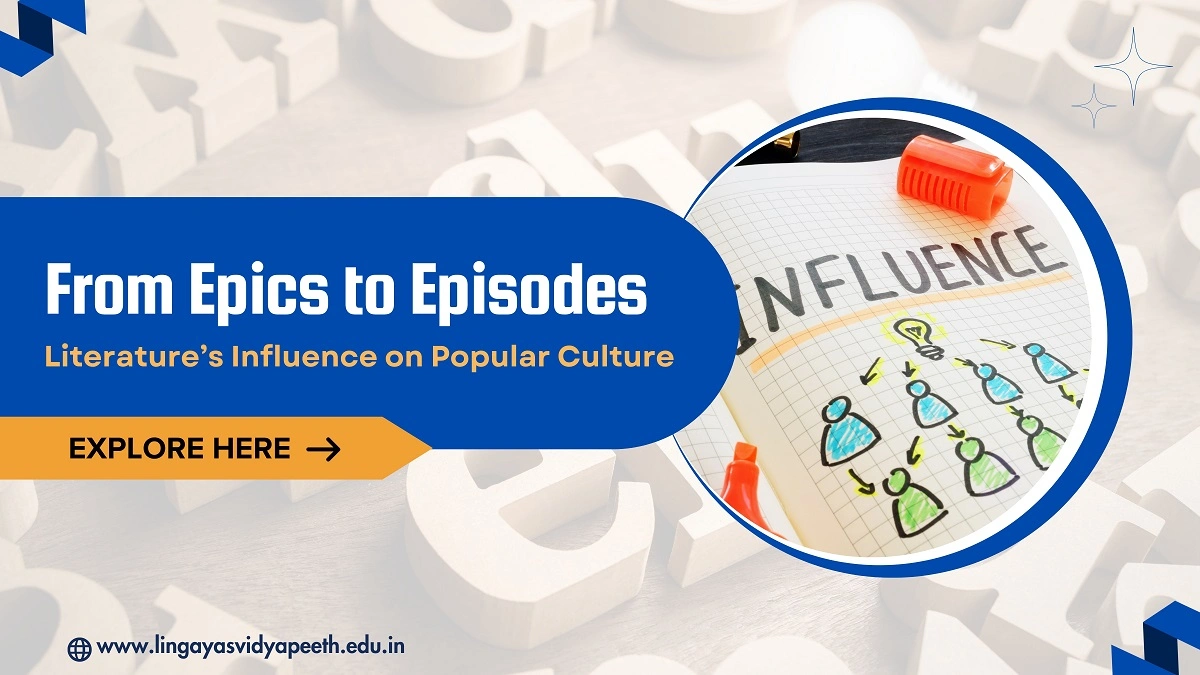Home » From Epics to Episodes – Literature’s Influence on Popular Culture

Have you ever wondered what’s behind the social media trends we follow daily? We get so engrossed in chasing the latest viral reels and hashtags that we forget the original source of creativity — literature. For most people, literature means books, poems, and stories. But in truth, literature shapes human culture, imagination, and emotions in ways we rarely notice.
Many of the songs we hum or series we binge-watch today have deep literary roots. While popular culture seems modern and fast-paced, its foundation lies in the timeless world of literature — long before the internet or social media existed.
When people discuss popular culture, they think of movies, music, or fashion. Yet behind all of this lies something older — literature. It doesn’t just live in libraries; it flows through our everyday lives.
From classic novels to modern web series, literature influences pop culture by providing stories that reflect human emotions and moral struggles. The worlds of books and entertainment may seem separate, but they are deeply intertwined — literature provides the stories, and popular culture brings them to life.
Consider William Shakespeare, the legendary English playwright and poet often regarded as the trendsetter of storytelling. His influence on modern cinema and theater remains unmatched.
Shakespeare’s stories survive not just through words but through characters that reflect universal human struggles — proving that literature can transcend centuries and mediums.
The magic of literature and cinema lies in adaptation. Some of the most famous movie franchises began as books — such as J.K. Rowling’s Harry Potter series, which defined a generation’s imagination.
Similarly, Jane Austen’s Pride and Prejudice continues to influence romantic storytelling. It inspired adaptations like Bride and Prejudice and the BBC series Pride and Prejudice, both proving that literary themes of love, class, and identity remain timeless.
Even Netflix’s Bridgerton draws inspiration from Julia Quinn’s romance novels, blending historical literature with modern cultural appeal.
Music too draws inspiration from poetry and prose. The lyrics of many popular songs are shaped by literary themes of emotion and storytelling.
Take Bob Dylan, for instance — a Nobel Prize-winning songwriter who proved that literature breathes through music. His poetic lyrics blur the line between literature and popular culture, showing how words can move from books to beats.
The influence of literature in India runs deep, rooted in the epics Ramayana and Mahabharata. These ancient texts explore duty, good vs. evil, and morality — themes that continue to shape Indian films, television, and storytelling.
In the 1980s, Ramanand Sagar’s Ramayana and B.R. Chopra’s Mahabharata captivated the entire nation. Their reruns during the COVID-19 lockdown proved their lasting cultural relevance.
Even today, their narrative depth inspires screenwriters and content creators across platforms.
Literature also influences fashion and design aesthetics. The gothic style of Edgar Allan Poe’s writings inspired dark, mysterious fashion trends.
Film adaptations of classic novels often showcase period costumes, reviving vintage styles in modern fashion. The fusion of literary art and fashion trends continues to redefine how we express identity through clothing.
Beyond entertainment, literature influences social awareness and activism. Classic novels often address identity, inequality, and social norms.
For example:
These examples show how literature’s social commentary transforms into cultural movements through film and media.
The rise of digital storytelling, fan fiction, and e-books has redefined how we engage with literature. Platforms like Wattpad and Reddit allow fans to reimagine classic tales.
The Twilight series, for instance, sparked fan fiction movements and online communities — showing how literary inspiration fuels creativity in modern digital spaces.
From Shakespeare to social media, literature remains the foundation of modern creativity. It inspires films, music, fashion, and digital trends, proving that even in a technological age, the power of written words endures.
So, the next time you enjoy a movie or viral trend, pause and ask — what timeless story inspired this moment?
Also Read
LLB course duration and scope after graduation
ChatGPT’s Interactive Study Chats: Ultimate Exam Guide
LLB course eligibility after 12th commerce stream
AI Layoffs 2025: How Automation Is Changing Tech Jobs in India
From
Tanya Sharma
BA (H) English- 3rd semester
RECENT POSTS
CATEGORIES
TAGS
Agriculture Agriculture future AI Architecture artificial intelligence Bachelor of Commerce BA English BA Psychology BTech AIML BTech CSE BTech cybersecurity BTech Engineering Business management career Career-Specific Education career guide career option career scope Civil engineering commerce and management Computer Science Computer science engineering Data science degree education Engineering Engineering students English Literature english program Fashion Design Fashion design course Higher Education Journalism journalism and mass communication law Law career Machine Learning mathematics MBA MBA specialization Mechanical Engineering Pharmacy Psychology Research and Development students
Lingaya's Vidyapeeth (LV) only conducts physical/online verification of any document related to examination on the following official email IDs:
It is important to note that the following email IDs and domains are fraudulent and do not belong to our university:
Please do not respond to or share any personal information with these fraudulent sources.